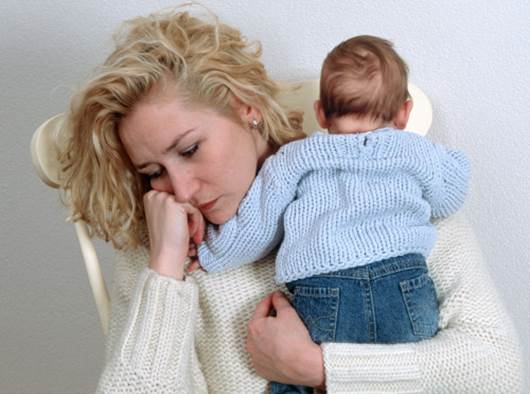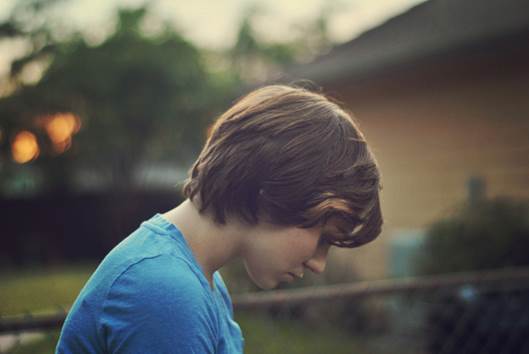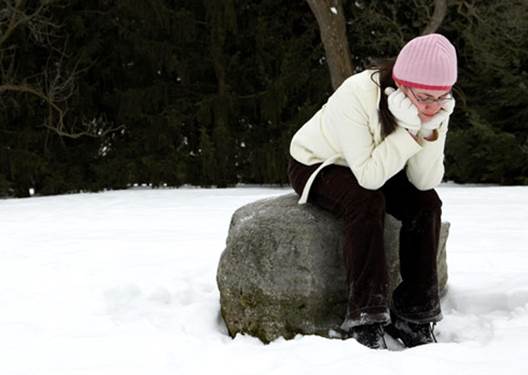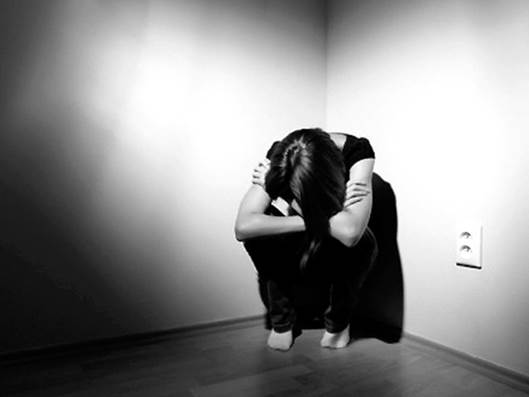‘Postnatal illness is a chemical imbalance
that stems from pregnancy and delivery’, says Diane Nehme, secretary of the
Association for Post Natal Illness (apni.org). ‘Some think it’s due to the huge
hormonal changes your body undergoes, while others think it’s down to the
physical and emotional stress of looking after a new-born baby. The only thing
we can say for certain is that it’s a depression that’s entirely related to
pregnancy’.
PND affects one in 10 women and usually
develops in the first four to six weeks after in childbirth, but can sometimes
appear after several months. The main symptoms are a persistent sadness, a loss
of interest in the world around you, anxiety, a lack of energy, poor concentration,
low confidence and guilt.
It’s important to remember that post natal
depression is an illness: it’s not your fault, you’re not alone and you will
recover.

‘Postnatal
illness is a chemical imbalance that stems from pregnancy and delivery’
Treat it:
the most important thing you can do is recognize you have a problem, so get
your PND diagnosed by your GP. Here’s what you can expect to happen:
§
Your doctor will ask you a series of questions
to identify whether it’s PND and may also perform a blood test to make sure
there’s nothing physical to blame for your lack of energy and low mood, such as
anaemia or an under-active thyroid.
§
Antidepressants are often prescribed, as these
work by balancing mood-altering chemicals in your brain, so can really help you
to get back on track and start enjoying motherhood. They take between two and
four weeks to start easing symptoms and it’s vital that you take the whole
course or the depression may return.
§
Cognitive Behavioural Therapy (CBT) is available
on the NHS and is really useful for PND. Your doctor can usually provide up to
six sessions. CBT helps sufferers challenge the way they think and replace
those worries, anxieties and lack of confidence with positive thoughts, helping
them feel they can cope with motherhood.
Signs of PND
If you answer ‘yes’ to one or more of the
following, you should see your GP:
1.
Do you generally feel sad the majority of the
time?
2.
Do everyday tasks seem like huge mountains to
climb, and you either have no energy or simply cannot be bothered?
3.
Do you feel like everyone else is thrilled by
your new baby but you’re not fussed about him/her? Do you feel like you’ve
‘disappeared’?
4.
Are you anxious about everything and feel guilty
that you are a bad mother?
Grief
‘Grief is the normal and natural reaction
to loss; unlike depression which is an illness that can have a physiological
cause’, says Carole Batchelor, MD of Grief Recovery UK
(griefrecoverymethod.co.uk). ‘Doctors often believe people should recover
simply because time has passed, and if they don’t they’re labeled “depressed”
and medication follows. But, unless the grief is resolved, nothing is likely to
be successful’.
You can’t put a time limit on how long it
takes to get over losing someone, and grief doesn’t just morph into depression,
so it needs to be treated differently. Also, grief isn’t just limited to losing
a loved one. Grief Recovery UK has identified over 40 life the death of a pet,
divorce, and even the failure to achieve a long-held dream.

‘Grief
is the normal and natural reaction to loss; unlike depression which is an
illness that can have a physiological cause’
Do you need help for grief?
If you’ve suffered a loss and answer ‘yes’
to any of these questions, think about seeking help:
1.
Do fond memories lead to painful thoughts and feelings?
2.
Do you find yourself ‘what events in a
never-ending loop?
3.
Do you feel guilty about things you had no
control over?
Treat it:
don’t mask your grief, or expect it to simply fade with time ask for help.
§
Ask your GP for a list of your local grief counselling
services.
§
Contact Grief Recovery UK (see above), whose
methods to target loss can relieve sadness and teach strategies to help you
cope.
§
Turn to the charity, Cruse Bereavement
(crusebereavementcare.org.uk), which provides a phone line and branches around
the UK where you can go for support and practical advice.
§
Speak to your employer many provide help and/or
counselling for bereaved employees.
Seasonal affective disorder (SAD)
We all feel a bit how on a gloomy winter
morning but, for some, the lack of daylight causes a biochemical impalance in
the hypothalamus, the part of the brain that controls mood, sleep and appetite.
As daylight hours shrink, SAD sufferers lack energy, sleep badly and feel down.
Treat it:
your GP may suggest standard depression treatments such as counselling, CBT or
even antidepressants, but as the cause of SAD is a lack of bright light, the
best solution is light therapy.

Seasonal
affective disorder (SAD)
Seasonal Affective Disorder expert Dr Lance
Workman suggests:
Chasing the sun: head out of a 30-minute walk at
lunchtime every day and get a light box. Visit sad.org.uk for advice on which
lamp to buy and how to use it. and swap your main holiday to mid-winter to get
two weeks of ‘real’ sunshine on a beach or even the ski slopes.
Taking supplements: you can’t enough vitamin D3, which can enhance mood, from sunlight
and food alone through winter.
Eating brighter: eat more raw fruit and vegetables, soya and brown rice and cut down
on protein, red meat, caffeine and alcohol. Also, make sure you get plenty of
omega-3s from oily fish, nuts and seeds, as this type of diet may reduce the
risk of SAD.
Depression
If you’re suffering low mood, with no
obvious trigger, there are a few possible causes. One is dysthymia, which is a
mild but ongoing low mood. ‘Unlike more severe forms of depression, sufferers
manage to get on with their daily life, but lack energy, have low self-esteem
and feel sad’, says Dr Layla McCay, assistant medical director at Bupa. Another
cause could be an underactive thyroid. The main symptom is often low mood,
muscle aches, weight gain and lack of concentration. It can be spotted with a
blood test. The other cause is simply depression – no fancy name, nothing that
would show up in a blood test, no trigger just an illness that can strike
anyone, at any time.
Treat it:
treatment depends on the severity of your illness.

Many
people have difficulties with SAD, and/or mild depression.
Mild or dysthymia
Lifestyle changes can help. Your GP may
recommend exercise – she can refer you to a PT or give you access to your local
gym, and may also recommend a local support group.
Mild to moderate
You can benefit from talking therapy. The
best options are: Interpersonal therapy, which focuses on your relationships
with family, friends, partners and colleagues; online CBT, where you talk to a
qualified therapist remotely; or counselling, where you talk through problems
with a counsellor at your doctor’s surgery. The NHS offers up to 12 weeks.
Moderate to severe
You may need a combination of the above
alongside antidepressants. There’s a huge range available and they’re not
addictive. You usually feel better after four to six months, but people who
suffer ongoing, severe depression may continue using them for five years or
more.
Depression checklist
Concerned you may be depressed? If you
experience four or more of these symptoms for more than two weeks, talk to your
GP.
§
Tiredness
§
Prolonged sadness
§
Low self-esteem
§
Poor concentration
§
Anxiety
§
Avoiding friends and family
§
Feeling helpless or hopeless
§
Poor sleep
§
Difficulty functioning at work
§
Feelings of guilt or worthlessness
§
Loss of appetite
§
Loss of sex drive
§
Suicidal thoughts
§
Self-harm